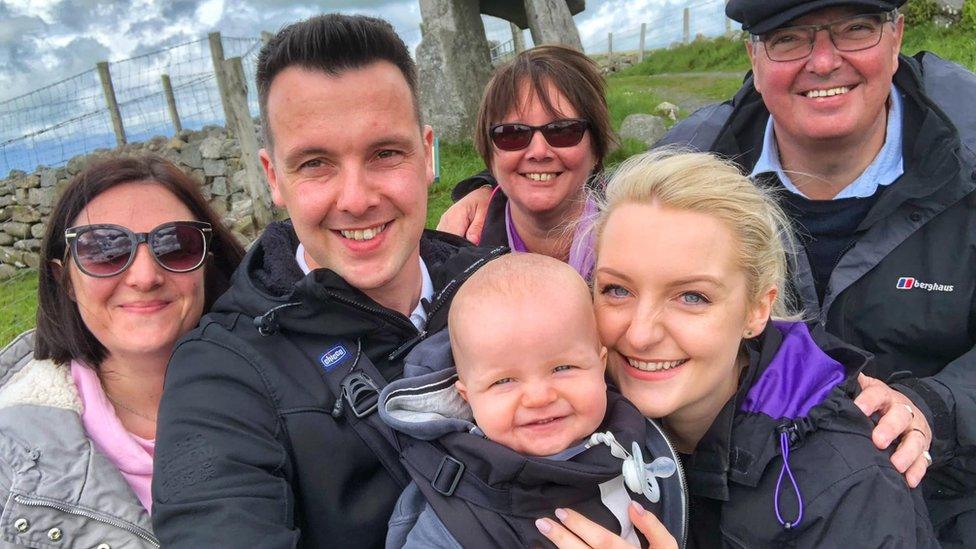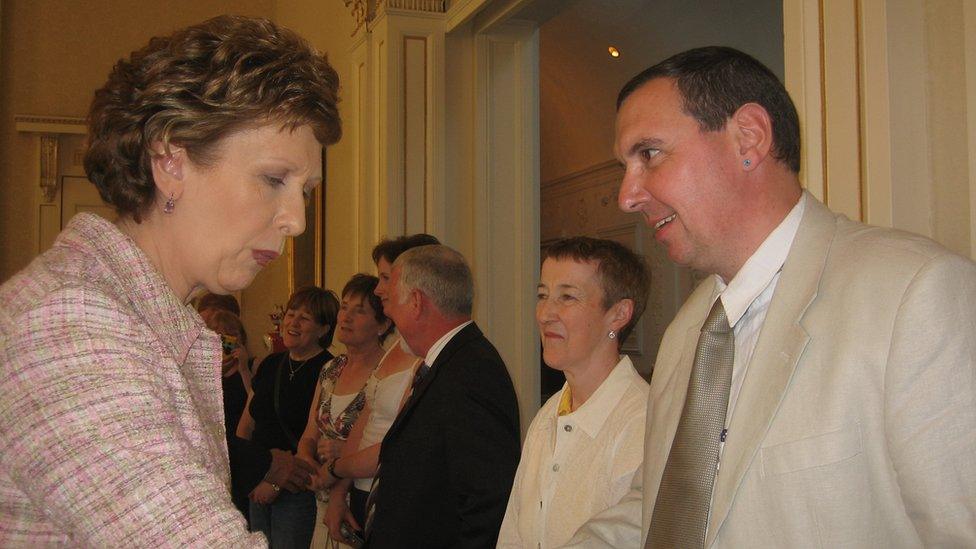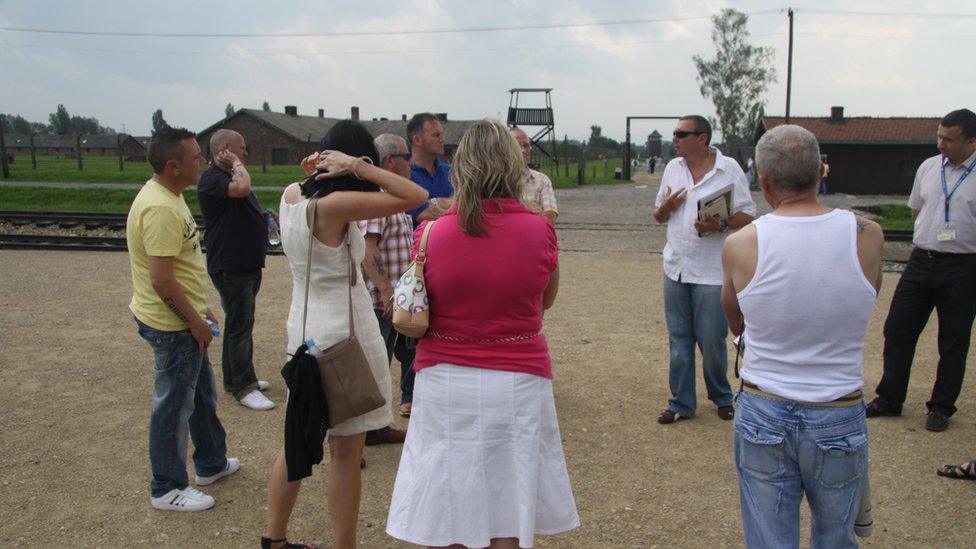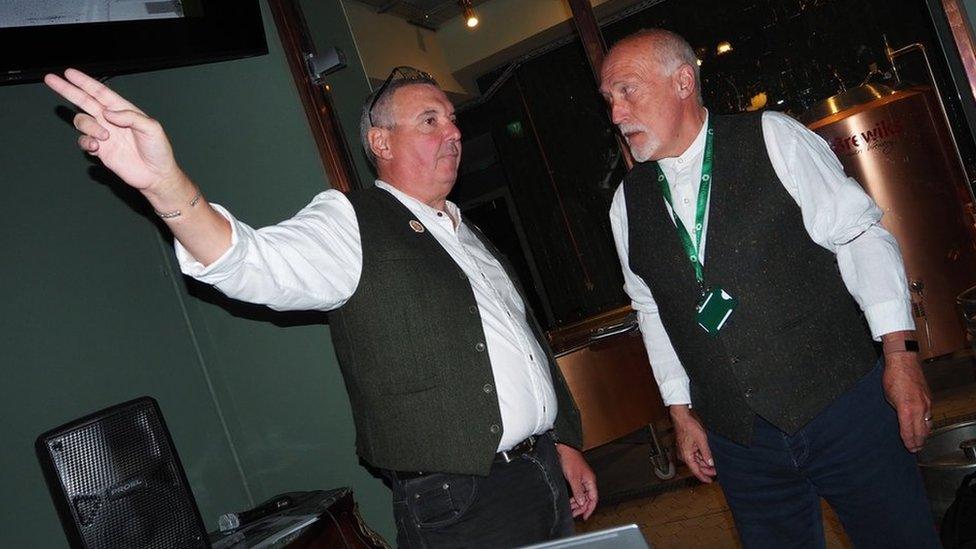The power of education: How a £5 bet changed a life
- Published

Frank Higgins, pictured to the right, with his family
Thirty years ago, Frank Higgins made a £5 bet with his wife that would change his life forever.
Her challenge? She bet he wouldn't go to a night class, at what is now the Belfast Met, to study English.
Not only did she lose the bet, but that course catapulted Frank into new careers, qualifications, becoming a tour guide at Auschwitz and decades of cross-community work.
Frank, now 61 and from Belfast, left school at 15 with no qualifications, joined the Army and later worked in the city's shipyard.
"You didn't need to be able to write in the shipyard," he tells BBC News NI.
"Whenever you lose the ability to write you try to hide it.
"Do you remember in school, kids doing an exam would put their hand over what they were trying to write so you couldn't see?
"That's what was happening to me. I couldn't spell. I stopped writing altogether."

Frank, right, meeting former Irish president Mary McAleese
His wife, who had herself started night school, saw how he was feeling and bet him the price of the class for motivation.
That very first class gave him the confidence to pursue all of the things he has since done.
The teacher "was the type of person who understood people like me who wanted to write, who were artistic, but didn't have a clue how to do it," he says.
GCSEs were followed by A-Levels, a history degree and masters at the Open University as well as numerous Belfast Met vocational courses.
Frank has now worked as an engineer, trainer and is currently a tour guide.
His love of history led him to write a book on the history of his birthplace, Brown's Square, now behind Castlecourt in Belfast city centre.
Brown's Square used to be tacked on to the Shankill Road, but is now separated by the Westlink.
A place steeped in history, it is known as a loyalist area but not many people are aware of its shared history.
"It was the place where the United Irishmen like Henry Joy McCracken met and planned the battle of Antrim, and James 'Jemmy' Hope, one of the United Irishmen died there," says Frank.
Work as a tour guide
"The masters gave me the tools to research and reference work and become a published author."
However, it is his cross-community work and his work as a tour guide that has made him most proud.
In 2009, Frank had his own training company and a passion for bringing communities together.
"I grew up in the street where the modern UVF was created. However, I had also worked for a training company in Andersonstown in west Belfast," he explains.
He says he opened an Irish language internet cafe on the Falls Road.
"Bearing in mind that I'm an ex-British soldier, that was opened by Gerry Adams," he says.
"We had European funding, what used to happen in the early 2000s was if you got European funding, you would tick the box to do cross community - maybe a football match for the other side.
"I wanted to do it for real and created a series of projects that taught Irish history in a neutral manner - covering all difficult things - not avoiding the Troubles or republican and loyalist paramilitaries."
He took a cross community group of children to Glasnevin Cemetery and the original Battle of the Boyne site, and it was that cross community work that would lead him to becoming a tour guide at Auschwitz.
During the 2000s, the Polish community in Northern Ireland had grown substantially.
Following clashes between Northern Ireland and Polish football fans in Belfast in 2009 at a World Cup qualifier, external, Frank was asked if he could think of a way to improve relations between the two communities.
"At the time I was at university and my lecturer, Prof Brian Barton, told me the Polish fighter squadron protected Belfast during World War Two," he recalls.
He devised a programme to teach the local community Polish history, which included a three-day visit to Krakow and a visit to Auschwitz.
At that stage he had a post-grad in education and he became a tour guide - verified through Krakow University.
Frank took over at the selection point in Auschwitz II-Birkenau.

At selection point in Auschwitz-Birkenau
He led tours there for about three and a half years.
"That's probably one of my finest moments, but I could never have done it if it hadn't been for that first course," he says.
He started his own tour guide company 'Belfastlad' and is now in the top 3% of five star guides in the world.
Job for life?
How different does he feel his life would have been had he not taken that first step 30 years ago?
"The shipyard used to be seen as a job for life, but of course that was not the case," he says.
When Frank started in Belfast shipyard Harland and Wolff, it employed 15,000, but now there is a fraction of that number., external
"I was paid off in 1997, but the difference for me was I had done my English and Maths. I had the confidence to go into another job," he says.
'Betting on yourself'
What advice does he have for someone who may be in the same situation as he was 30 years ago?
"As someone who left school at 15 with no qualifications, if I can do it, anybody can," he says.

Frank (left) pictured along with Gerry McClory, with whom he runs a tour of Belfast called Fox and Hounds
"It's really that simple. It's not about what you think you are, it's about betting on yourself," he says.
"You're only limited by what you think you can do. You don't know until you put that first foot on the rung of that ladder of learning."
In 2019-2020, Department for the Economy (DE) figures show that of the 132,354 students enrolled at further education colleges across Northern Ireland, 38,445 were 25 and over., external
A Northern Ireland Statistics and Research Agency (Nisra) report covering 2015-16 to 2019-20 found that since 2015-16, the proportion of aged '19 and under' enrolments has increased from 55.6% to 58.9% but the proportion of those in the '25 and over' age group has decreased, from 32.4% to 29.1%., external
For Frank, learning continues, and he is now back at Belfast Met studying Digital Marketing.
Belfast Met's head of business school Fiona Dempsey says Frank is an "exceptional student who has brought a wealth of knowledge and experience to the classroom, whilst providing guidance and inspiration to others".
Related topics
- Published25 March 2021
